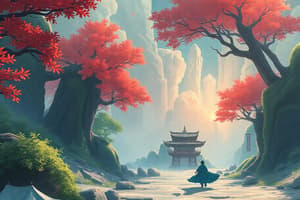Podcast
Questions and Answers
What was the influence of neighboring Asian literatures on Japanese literature?
What was the influence of neighboring Asian literatures on Japanese literature?
- Influenced by China only
- Influenced by India only
- No significant influence
- Influenced by both China and India (correct)
What was the language used in early Japanese texts?
What was the language used in early Japanese texts?
- A hybrid of Chinese characters and Japanese syntax
- Classical Chinese (correct)
- Hiragana
- Classical Japanese
What are some important works from the Heian period in Japanese literature?
What are some important works from the Heian period in Japanese literature?
- The Tale of Genji, Kokin Wakashū, and The Pillow Book (correct)
- The Kojiki, Nihon Shoki, and the Man'yōshū
- Renga and Noh theater
- War tales and histories
What was the cultural focus of Japanese literature during the Heian period?
What was the cultural focus of Japanese literature during the Heian period?
What is renga in Japanese literature?
What is renga in Japanese literature?
Who is recognized as the greatest master of haiku in Japanese literature?
Who is recognized as the greatest master of haiku in Japanese literature?
What is the significance of European literature in Japanese literature during the Meiji period?
What is the significance of European literature in Japanese literature during the Meiji period?
Who are some important writers from the Meiji period in Japanese literature?
Who are some important writers from the Meiji period in Japanese literature?
What is the emphasis in modern Japanese literature?
What is the emphasis in modern Japanese literature?
Flashcards
Early Japanese Literature
Early Japanese Literature
Initially written in Classical Chinese, then combining Chinese characters with Japanese grammar.
Heian Period Literature
Heian Period Literature
Golden age of Japanese literature, focused on the elite, like nobles and monks.
Tale of Genji
Tale of Genji
A significant novel from the Heian period, often called the world's first novel.
Natsume Soseki
Natsume Soseki
Signup and view all the flashcards
Modern Japanese Literature Focus
Modern Japanese Literature Focus
Signup and view all the flashcards
Manga's Influence
Manga's Influence
Signup and view all the flashcards
Popular Fiction Rise
Popular Fiction Rise
Signup and view all the flashcards
Noh Theater
Noh Theater
Signup and view all the flashcards
Matsuo Bashō
Matsuo Bashō
Signup and view all the flashcards
Study Notes
Literature of Japan
-
Japanese literature has been influenced by neighboring Asian literatures, especially China and India.
-
Early Japanese texts were written in Classical Chinese before transitioning to a hybrid of Chinese characters used in Japanese syntax.
-
The Nara period saw the creation of the Kojiki, Nihon Shoki, and the Man'yōshū, and the tale of Urashima Tarō.
-
The Heian period is considered the golden era of art and literature in Japan, with literature becoming centered on the cultural elite of nobility and monks.
-
The Tale of Genji, Kokin Wakashū, and The Pillow Book are important works from this era.
-
The Kamakura-Muromachi period saw the development of a warrior class and war tales, histories, and related stories.
-
The decline of the imperial court in the Muromachi period led to cultural activity spreading through all levels of society, with new genres such as renga and Noh theater developing.
-
The Edo period saw popular drama develop, and many different genres of literature make their debut, helped by a rising literacy rate.
-
Ihara Saikaku might be said to have given birth to the modern consciousness of the novel in Japan.
-
Matsuo Bashō is recognized as the greatest master of haiku, and Fukuda Chiyo-ni is widely regarded as one of the greatest haiku poets.
-
During the Meiji period, European literature brought free verse into the poetic repertoire, and young Japanese prose writers and dramatists assimilated new ideas and artistic schools.
-
Natsume Sōseki's Wagahai wa neko de aru, Botchan, and Kokoro, and Mori Ōgai's The Dancing Girl and The Wild Geese are important works from this period.A Brief History of Japanese Literature
-
Natsume Soseki's shift from Romanticism to Naturalism
-
The establishment of "I Novel" in Japanese literature
-
The rise of Neo-romanticism
-
The proletarian literary movement during the 1920s and early 1930s
-
The influence of World War II and Japan's defeat on Japanese literature
-
The prominence of writers in the 1970s and 1980s identified with intellectual and moral issues
-
The emergence of avant-garde writers such as Kobo Abe
-
The popularity of Haruki Murakami and Banana Yoshimoto in contemporary Japanese literature
-
The emphasis on subjects' inner lives in modern Japanese literature
-
The flourishing of popular fiction, non-fiction, and children's literature in urban Japan in the 1980s
-
The penetration of manga in almost every sector of the popular market
-
The emergence of literature utilizing new media
-
The brief period of success of female writers in Japan during the Heian period and the challenges they faced
-
The literary contests and awards in which authors can participate and be awarded.
Studying That Suits You
Use AI to generate personalized quizzes and flashcards to suit your learning preferences.




